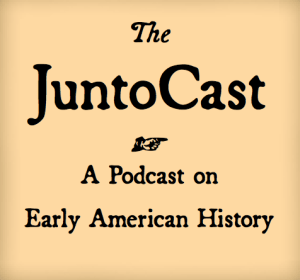 We’re happy to bring you the thirteenth episode of “The JuntoCast.”
We’re happy to bring you the thirteenth episode of “The JuntoCast.”
In this month’s episode, Michael Hattem, Roy Rogers, and Mark Boonshoft discuss education in early America, including its role in the colonial period, the American Revolution, and the early republic.
As always, you can also subscribe to the podcast in iTunes. We would greatly appreciate it if our listeners could take a moment to rate or, better yet, review the podcast in iTunes. As always, any and all feedback from our listeners is greatly welcomed and appreciated.
Further Reading
Bailyn, Bernard. Education in the Forming of American Society: Needs and Opportunities for Study. Chapel Hill: University of North Carolina Press, 1960.
Boonshoft, Mark. “The Litchfield Network: Education, Social Capital, and the Rise and Fall of a Political Dynasty, 1784-1833.” Journal of the Early Republic 34 (Winter 2014): 561–95.
Brown, Richard D. The Strength of a People: The Idea of an Informed Citizenry in America, 1650-1870. Chapel Hill: University of North Carolina Press, 1997.
Cremin, Lawrence A. American Education: The Colonial Experience, 1607-1783. New York: Harper & Row, 1970.
––––––. American Education: The National Experience, 1783-1876. New York: Harper and Row, 1980.
Hoeveler, J. David. Creating the American Mind: Intellect and Politics in the Colonial Colleges. Lanham: Rowman & Littlefield Publishers, 2007.
Justice, Benjamin, ed. The Founding Fathers, Education, and “The Great Contest”: The American Philosophical Society Prize of 1797. New York: Palgrave Macmillan, 2013.
Kaestle, Carl. Pillars of the Republic: Common Schools and American Society, 1780-1860. New York: Hill and Wang, 1983.
Kelley, Mary. Learning to Stand & Speak: Women, Education, and Public Life in America’s Republic. Chapel Hill: Published for the Omohundro Institute of Early American History and Culture, Williamsburg, Virginia, by the University of North Carolina Press, 2006.
Klein, Milton M. “Church, State, and Education: Testing the Issue in Colonial New York.” New York History 45 (1964): 291–303.
McMahon, Lucia. Mere Equals: The Paradox of Educated Women in the Early American Republic. Ithaca: Cornell University Press, 2012.
Middlekauf, Robert. Ancients and Axioms: Secondary Education in Eighteenth-Century New England. New Haven: Yale University Press, 1963.
Moroney, Siobhan. “Birth of a Canon: The Historiography of Early Republican Educational Thought.” History of Education Quarterly 39, no. 4 (December 1999): 476–491.
Nash, Margaret A. “Rethinking Republican Motherhood: Benjamin Rush and the Young Ladies’ Academy of Philadelphia.” Journal of the Early Republic 17, no. 2 (1997): 171–91.
––––––. Women’s Education in the United States, 1780-1840. New York: Palgrave Macmillan, 2005.
Opal, J. M. “Exciting Emulation: Academies and the Transformation of the Rural North, 1780s-1820s.” The Journal of American History 91, no. 2 (2004): 445–470.
Sloan, Douglas. The Scottish Enlightenment and the American College Ideal. New York: Teachers College Press, 1971.
Sumner, Margaret. Collegiate Republic: Cultivating an Ideal Society in Early America. Charlottesville: University of Virginia Press, 2014.
Zagarri, Rosemarie. “Politics and Civil Society: A Discussion of Mary Kelley’s Learning to Stand and Speak.” Journal of the Early Republic 28, no. 1 (Spring 2008): 61–73.
Interesting episode! Early education is a hot topic here at the Litchfield Historical Society- visit the Ledger to learn more about the Litchfield Female Academy, the Litchfield Law School, and the students and instructors of both at http://www.litchfieldhistoricalsociety.org/ledger/.